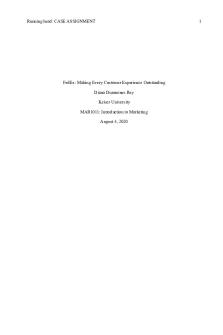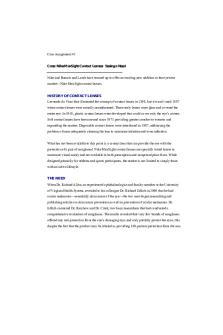Legal Case Briefing Assignment 1 PDF

| Title | Legal Case Briefing Assignment 1 |
|---|---|
| Author | Collin Neal |
| Course | Law and Public Affairs |
| Institution | Indiana University Bloomington |
| Pages | 4 |
| File Size | 90.4 KB |
| File Type | |
| Total Downloads | 89 |
| Total Views | 149 |
Summary
mandatory legal case brief...
Description
Date: September 22, 2019 To:
Charles R. Dunlap, J.D.
From: Collin E. Neal Re:
Hamer v. Sidway, 124 N.Y. 538
Throughout the process of researching this case I have developed a clear and concise understanding of the underlying forces involved to the fullest extent of my ability. The case: “Foregoing smoking, drinking, etc. as consideration in a contract: Hamer v. Sidway, 124 N.Y. 538” has been outlined into six parts as follows: 1) Facts and Procedural History, 2) Legal Issue, 3) Decision, 4) Principle, 5) Reasoning, 6) Policy Implications. Facts and Procedural History: On March 20, 1869 William E. Story (Story I) promised his nephew, William E. Story II (Story II) $5,000 if he were to abstain from the use of alcohol, tobacco, swearing, playing cards, and playing billiards until he reaches the age of 21. William E Story II accepted the $5,000 promise and did in fact refrain from the prohibited activities. Later, Story I stated that he would prefer to hold onto the promised funds until his nephew reach a greater age. $5,000 thousand dollars in 1890 is now approximately worth $130,000, so this was a large sum of money. Story I also declared that the $5,000 would accrue interest while still in his holding. Story II agrees with his uncle and lets him hold onto the money until he is older. William E. Story I died on January 29, 1887 without transferring the promised money to his nephew. Meanwhile, Story II had transferred the $5,000 to his wife, and his wife later transferred this money to Louisa Hamer on assignment. The estate of William E. Story I refused to grant Hamer the money because there was no “binding contract” due to lack of consideration. This resulted in Hamer suing the estates executor: Franklin Sidway. This case went from Trial Court to Appellate Division, to the Court of Appeals of New York.
Legal Issue: This case has to do with United States Contract Case Law. Since the case is built around documents that were exchanged between two people, we must consider American contract law. The executor of the William E. Story estate did not believe there was a binding contract and refused to grant Louisa Hamer the funds due to an absence of consideration. We must also consider enforcement of promises and forbearance. Decision: The estate of William E. Story and its executor Franklin Sidway were sued for $5,000. The money was paid to Hamer from the estate. William E. Story II made a promise with his uncle to not drink alcohol, use tobacco, play cards, swear, or play billiards. Story II held up his side of the promise, and the opinion of Judge Alton Parker states that William E. Story was contractually required to satisfy his side of the promise as well. Franklin Sidway, the executor of the estate was legally bound to deliver the promised $5,000 to Louisa Hamer. Principle: When considering this case, we must ponder bargain theory. Bargain theory states that a typical contract must have two parties, one party the “promisee” and the other party the “promisor”. You cannot create a contract without consideration. Since Story II was abstinent from alcohol, tobacco, swearing, etc. it is considered adequate consideration. This makes it a valid and enforceable contract. Also, William E. Story II did agree to incur a detriment. Reasoning: The opinion was decided on the basis that the promise made by William E. Story to pay his nephew $5,000 for not partaking in certain activities. This promise was fulfilled for the required amount of time (until Story II turned 21 years old) and so the other side of the promise must be fulfilled as well. Policy Implications: Hamer is an important case in history because it establishes forbearance (agreeing not to do something that you have the legal right to do) can constitute adequate consideration to form a valid and enforceable contract.
Case that Cites and Discusses Hamer v. Sidway, 124 N.Y. 538: (Harvey v. Morgan Co.) In Harvey v. Morgan Co., an employee is injured on the job while filing documents in a filing cabinet. The injured plaintiff received treatment for her injuries and her regular compensation during this period. The plaintiff sued on the basis of an oral contract which was based upon a claim against the defendant for personal injuries at work. During the case, Hamer is referenced when considering forbearance, as well as fair and conscionable contracts (Munic. Ct. Queens 1937). Forbearance is agreeing not to do something that you have the legal right to do, and this is one of the policy implications. This can constitute adequate consideration from a valid and enforceable contract. This case does follow the original case (Hamer) in its final opinion. Law Review Article that Cites and Discusses Hamer v. Sidway, 124 N.Y. 538: Cross-Border Commercial Contracts and Consideration, 34 Berkeley J. Int'l L. 1 This law review article touches on contracts made for the exchange of goods and services across national borders. The article considers “the contract” and how it might be much less global then business as a whole (Kevin J. Fandl, 2016). It examines the common law contract and the requirements for consideration. Consideration can make or break a contract, and in Hamer it plays a very large role in the outcome of the case. The author of this article is referencing Hamer v. Sidway in order to further establish a major part of contract law and explain how contract law and consideration can be overlooked and what affects that might have on commercial contracts (Kevin J. Fandl, 2016).
Works Cited Hamer v. Sidway, 124 N.Y. 538, 27 N.E. 256, 1891 N.Y. LEXIS 1396 (Court of Appeals of New York April 14, 1891, Decided). “Legal Dictionary.” Review of HAMER V. SIDWAY, by Kailyn Champlin, and Cyd Oldham. Hamer v. Sidway, 124 N.Y. 538 (N.Y. 1891) Harvey v. J.P. Morgan Co., 166 Misc. 455, 464, 2 N.Y.S.2d 520, 531 (Munic. Ct. Queens 1937) Kevin J. Fandl, J.D., Ph.D. * (Fall, 2016). ARTICLE: Cross-Border Commercial Contracts and Consideration. Berkeley Journal of International Law, 34, 1....
Similar Free PDFs

Legal Case Briefing Assignment 1
- 4 Pages

Case briefing Assignment 2
- 3 Pages

Killion Case Briefing 4
- 1 Pages

Creative Briefing Assignment
- 4 Pages

LAW115 Briefing Case
- 5 Pages

Briefing 3 Fraser - case brief
- 1 Pages

Week 1 Case Assignment
- 4 Pages

Assignment 1 case study
- 10 Pages

Assignment 1 CASE Study
- 9 Pages

Assignment 1 Zipcar Case
- 2 Pages

Case Study Assignment 1
- 21 Pages

Assignment Case 1
- 4 Pages

Assignment Case Study-1
- 6 Pages
Popular Institutions
- Tinajero National High School - Annex
- Politeknik Caltex Riau
- Yokohama City University
- SGT University
- University of Al-Qadisiyah
- Divine Word College of Vigan
- Techniek College Rotterdam
- Universidade de Santiago
- Universiti Teknologi MARA Cawangan Johor Kampus Pasir Gudang
- Poltekkes Kemenkes Yogyakarta
- Baguio City National High School
- Colegio san marcos
- preparatoria uno
- Centro de Bachillerato Tecnológico Industrial y de Servicios No. 107
- Dalian Maritime University
- Quang Trung Secondary School
- Colegio Tecnológico en Informática
- Corporación Regional de Educación Superior
- Grupo CEDVA
- Dar Al Uloom University
- Centro de Estudios Preuniversitarios de la Universidad Nacional de Ingeniería
- 上智大学
- Aakash International School, Nuna Majara
- San Felipe Neri Catholic School
- Kang Chiao International School - New Taipei City
- Misamis Occidental National High School
- Institución Educativa Escuela Normal Juan Ladrilleros
- Kolehiyo ng Pantukan
- Batanes State College
- Instituto Continental
- Sekolah Menengah Kejuruan Kesehatan Kaltara (Tarakan)
- Colegio de La Inmaculada Concepcion - Cebu


